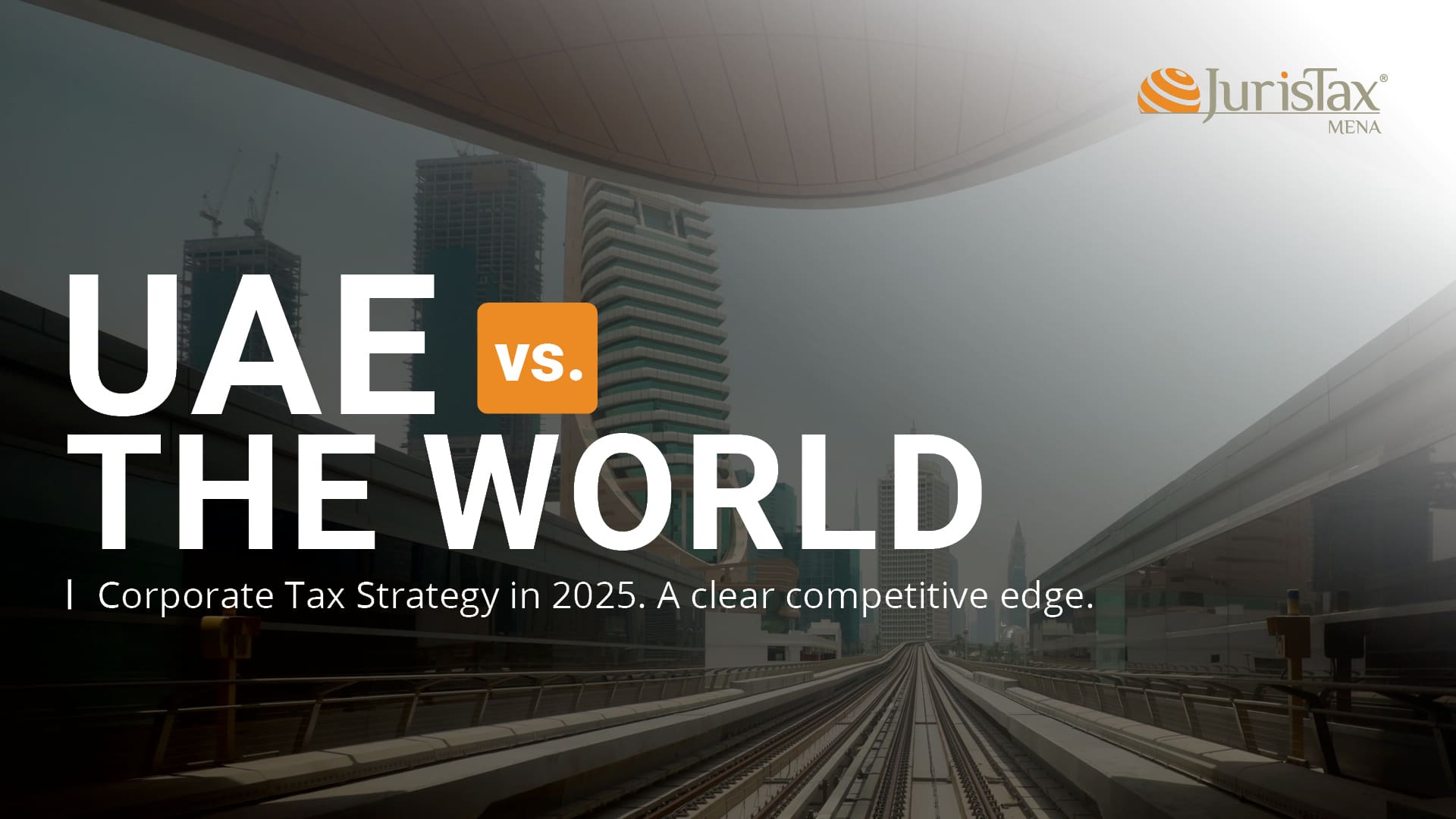UAE vs. the World: Corporate Tax Strategy in 2025 - A Clear Competitive Edge
Why Global Investors, Corporate Groups, and Advisors Are Choosing the UAE for Structuring and Growth

Why Global Investors, Corporate Groups, and Advisors Are Choosing the UAE for Structuring and Growth
A New Global Tax Landscape
In 2025, the international tax landscape is being reshaped by the OECD’s Pillar Two framework and an accelerating push for transparency, substance, and standardization. Multinational groups must now rethink how — and where — they operate.
Amid these changes, the United Arab Emirates (UAE) has positioned itself as a tax-efficient, regulation-aligned, and commercially strategic hub — offering unique advantages that balance global compliance with fiscal efficiency.
1. Corporate Tax at a Glance: UAE vs. Other Global Jurisdictions
| Jurisdiction | Corporate Tax Rate (2025) | Global Minimum Tax (Pillar Two) | Strategic Positioning |
|---|---|---|---|
| UAE | 9% (profits > AED 375,000) | Yes – only for MNEs ≥ €750M | Low-tax, compliant, 0% zone incentives |
| Ireland | 12.5% (15% for large MNEs) | Yes – top-up tax for MNEs | EU-based, rising regulation |
| Netherlands | 19% / 25.8% | Yes | High substance requirements, full OECD adoption |
| Luxembourg | ~24.9% (incl. solidarity tax) | Yes | Complex compliance, regulatory tightening |
| Switzerland | ~14–17% (by canton) | Yes – top-up via canton-level Globe | Attractive, but costlier and increasingly scrutinized |
| Cyprus | 12.5% (15% for MNEs by 2025) | Yes – under phased adoption | Treaty-based planning; limited long-term scalability |
Key Insight: The UAE combines one of the world’s lowest effective tax rates with full OECD alignment — without capital gains tax, withholding tax, or complex repatriation barriers.
2. What’s New in UAE Corporate Tax (2025)
- Corporate Tax Now Live: A 9% corporate tax applies to business profits exceeding AED 375,000 (Federal Decree-Law No. 47 of 2022).
- Pillar Two Implementation: From January 2025, a 15% minimum tax applies only to multinational groups with global revenues ≥ €750 million.
- Transfer Pricing Rules Enforced: Disclosure forms, Master File, and Local File are mandatory for qualifying entities.
- ESR Abolished: As per Cabinet Decision No. 98 of 2024, Economic Substance Reporting is no longer required for FYs beginning on or after 1 Jan 2023.
- 0% for Free Zones Preserved: Qualifying Free Zone Persons (QFZPs) continue to benefit from a 0% tax rate on eligible income.
3. What Sets the UAE Apart
Tax Efficiency + Regulatory Alignment
- 9% corporate tax for mainland entities
- 0% tax on qualifying Free Zone income
- No tax on dividends, capital gains, or interest
No Withholding Tax
- No tax on outbound dividends, interest, royalties, or service fees — streamlining cross-border flows
100% Foreign Ownership
- Full foreign ownership available across Free Zones and most mainland sectors
140+ Double Taxation Agreements (DTAs)
- UAE’s extensive treaty network supports efficient repatriation and reduced foreign tax exposure
4. Designated Free Zones: Preserving 0% Corporate Tax
Entities in Designated Free Zones may access a 0% tax rate on qualifying income if they meet all four conditions:
- Recognized as a Qualifying Free Zone Person
- Conduct Qualifying Activities (e.g., holding shares, logistics, fund management, manufacturing)
- Maintain Adequate Economic Substance in the UAE
- Segregate Qualifying vs. Non-Qualifying Income in their financial records
Note: Only Free Zones listed in official Cabinet decisions are eligible for this treatment.
5. Structuring Use Cases: Why Clients Are Relocating to the UAE?
| Use Case | Why the UAE? |
|---|---|
| Regional HQ for MENA | Strategic location, low tax, full repatriation |
| Family Office (DIFC / ADGM) | Succession planning, asset protection, 0% for qualifying structures |
| Investment Holding Company | No capital gains tax, no withholding tax, global treaty access |
| IP Licensing or Royalty Arm | 0% tax on qualifying IP income from Designated Free Zones |
| Private Equity / Fund Platform | DIFC/ADGM regulatory environment, international LP confidence |
6. Planning for 2025 and Beyond
- Free Zone Compliance is Key: Ensure licensing, substance, and activity conditions are met to retain 0% status.
- Pillar Two Top-Up Applies to MNEs Only: SMEs and mid-sized groups remain unaffected by the global minimum tax.
- Transfer Pricing Enforcement: Related-party transactions must be benchmarked, documented, and disclosed.
- Annual Filing Required: All taxable entities must file UAE corporate tax returns and maintain audited accounts.
Conclusion: The UAE — Transparent, Competitive, and Future-Proof
The UAE is no longer just a low-tax jurisdiction — it is a globally aligned, business-forward platform.
With a simplified 9% regime, preserved 0% Free Zone benefits, no capital gains or withholding tax, and one of the world’s strongest tax treaty networks, the UAE delivers a rare blend of fiscal efficiency, compliance, and commercial agility — built for the future.
About JurisTax MENA
At JurisTax MENA, we empower multinational groups, investment firms, and entrepreneurs with forward-thinking tax structuring, Free Zone advisory, and cross-border compliance solutions.
Whether you’re launching a new venture or migrating an existing structure, we ensure your strategy is aligned, defensible, and globally optimized.
Contact us today to explore how your structure can benefit from the UAE’s 2025 corporate tax edge.
